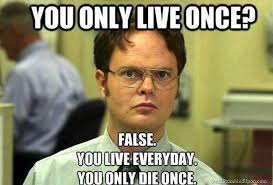How a Whole Life Insurance Salesman Confused Me Into Not Buying


What I didn’t want to enter into the equation, however, was a long presentation by an insurance salesman on a topic I didn’t know much about: whole life insurance. But that’s what I got, and it didn’t end well.
Unfortunately, the wrong insurance salesman tried selling whole life insurance to us, and the ordeal was so confusing and full of insurance salesman cliches that it could have been cast for a short video on how not to sell insurance.
We were young and had enough income to buy a condo and consider adding to our family — which sounds like the best time to buy life insurance. If one of us died, having a child, mortgage and other expenses would be too much for the other to pay without insurance.
An insurance salesman knocks on the door…
I thought it was a pretty straightforward scenario, and one that could be solved relatively quickly with an insurance expert. I called an insurance agent, and we set up a time for him to come over and explain policies to my wife and I.
I didn’t know then what I know now about life insurance — that a term policy was much better for our needs than whole life.
When the salesman arrived at our door, his first and only pitch was for whole life insurance. I don’t remember all of the details, but the main thing that stands out is how he kept trying to show us how whole life insurance was an investment we should take advantage of.
What is whole life insurance?
Before getting into the investment pros and cons of a whole life policy, it’s first worth understanding what whole life insurance is.
As the name states, it’s insurance coverage for your whole life. You’re covered until death, when your beneficiary will receive the benefits.
That sounds great until you look at the high costs compared to term life insurance — which covers a certain number of years, such as 20. And since our family was just starting and we wanted to cover our family’s expenses if one of us died during our working lives or while our child was under 18, term life insurance seemed a better fit.
But not to the salesman who was in our dining room. Whole life was what we needed, he said, and was a great investment opportunity that we shouldn’t pass up.
Problems with whole life

As an investment, if it’s something I didn’t understand, then I saw no reason to buy whole life policies.
He talked about the price of whole life insurance, which I don’t remember the specific numbers, but I do remember it being at least triple what I later found out to be the cost of term life insurance.
Looking at the numbers now, term life insurance is incredibly cheaper than whole life. After a 20-year term policy, I could either drop the coverage, test for a new policy, or pay more to continue the same policy.
What term life insurance isn’t
Term life insurance is meant to insure you for a specified amount of time. Since your major earning years are when this is needed the most, a term policy of 20-30 years is a smart idea.
A whole life policy covers you for your entire life, and your heirs will get the face value of the policy when you die. Any savings that you’ve built up in the policy but haven’t used goes back to the insurance company when you die.
A term life insurance policy doesn’t have a savings account. That financial move is left to you to do on your own. This is the key part that kept bugging me during the insurance agent’s spiel to us in our home.
Why would I use a whole life insurance policy as an investment when I could take the difference in the price of the premiums between whole life and term life policies and invest it myself?
That’s the kicker that got us to get the guy out the door.
To learn more about whole life insurance, the Whole Life Rebellion starts May 31 as a way to educate consumers about the risks of investing in whole life insurance.


Great information! We were pitched a whole life policy for by a well known investment firm when we were looking into college savings for our son when he was a baby. That’s when we learned so many things – 1) our financial adviser only wanted his commission and certainly did not have our best interests in mind, 2) whole life insurance is not a good investment, and 3) term life is the most economical way to ensure your loved ones are taken care if you die.